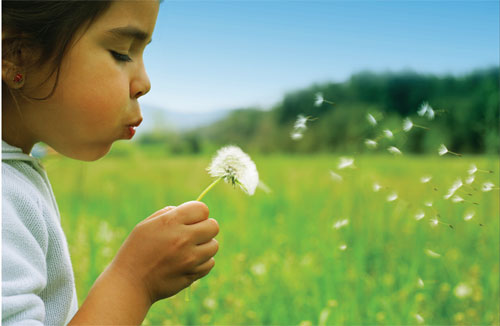Allergies can range from the seasonally annoying to the perpetually life threatening but they all share one thing in common: they are unavoidable. Allergies are particularly bad when children get them as you have to constantly keep an eye on them (even more than usual) an you know that sooner or later they will trigger the allergic response.
Mild allergies are usually more annoying than dangerous but because you don’t get them as often you might not even know what the cause is. Allergy to pollen is the most widespread example and one that millions of people experience each year. If you have a child with a pollen allergy you should always have some mild antihistamines with you in spring and summer, particularly when taking him to the park. Even if the pollen does not affect him physically (he doesn’t get rashes or red eyes) the antihistamines will help with the irritation of the throat.
Dust allergies pose similar concerns for children, and inadequate home cleaning — think unclean HVAC systems — can contribute to dust accumulation. Maintaining a clean living environment is essential to managing dust-related allergies, and ensuring the well-being of your child. Regular cleaning routines, especially paying attention to HVAC system cleanliness achieved with the help of experts at blueoxenergy.com often become integral components of allergy management, minimizing the impact of these common yet bothersome reactions. This can be understood better with the help of an example. Imagine a scenario where your children frequently fall ill during the summer while indoors, experiencing red eyes, sneezing, and coughing. The culprit could be the accumulation of dust and allergens within the air ducts of the air conditioner, circulating throughout the house. However, this situation could have been prevented by regular air conditioner servicing with experts from reputable platforms like Dutch Oil. Keep in mind that by remaining vigilant and proactive, parents can establish a healthier and more comfortable living environment for their children, significantly reducing the chances of allergic reactions.
Anyway, coming back to the topic, more severe, life-threatening allergies like some food ones (shellfish for instance) or allergies to bee stings are much more stressful both on the child and the parent. Children with bee allergies will live in perpetual fear of the little bugs and children with food allergies will need to display an uncharacteristic (at that age) talent for staying alert at what they eat. You should find out what your child is allergic to as soon as possible. The easiest way is through a food allergy blood test, like the one at this link http://www.healthtestingcenters.com/allergy-testing.aspx available online at a reasonable price. After identifying what foods your child is allergic to you get to the hard part, teaching both yourself and your child how to avoid allergens and, worst of all, how to use an epinephrine pen in case of emergency. Console yourself by knowing that, statistically speaking, children with food allergies are more independent and have better reasoning skills.
Of course, your job does not end at ensuring an allergen-free environment. There are virtually dozens of aggravating factors for every allergy, some of which are widespread and even dangerous. One of the most obvious allergy amplifiers is smoking. Smoking can in cases of mild allergies somewhat dampen the effect of allergen. Of course, if your allergy is anything more than a hay fever you’ll be doing significantly more damage as the irritant smoke interacts with the already inflamed larynx, aggravating symptoms. Of course, this doesn’t mean that you should smoke around your kind nor should you smoke in general.
Another aggravating factor for allergies is stress and while your child should be stressed by schoolwork he should be able to keep it under control.
Allergies are quite annoying and very dangerous in many cases. So it’s no wonder that allergies present a significant challenge for both parent and child, especially while the latter is still young. Of course with good preparation and education you can keep your child relatively safe, or rather teach him than even in a dangerous environment everything can go right if he’s careful and enterprising.

